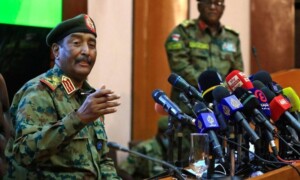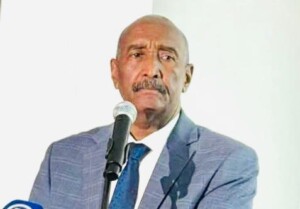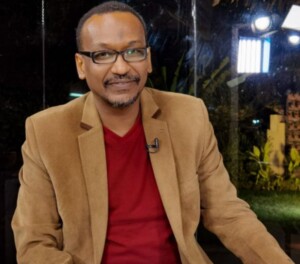El Degeir: Sudan opposition broke promise to rebel groups
Omar El Degeir, President of the Sudanese Congress Party, and leading member of the Forces for Freedom and Change (FFC) has acknowledged that allied opposition made a mistake when it did not prioritise the peace file over the Constitutional Declaration.
In a forum of El Tayar newspaper in Khartoum on Thursday, El Degeir said that the leaders of the FFC refused granting the Sudan Revolutionary Front (SRF, a coalition of armed movements) the posts of two members of the Sovereign Council on the ground that they rejected the idea of quotas.
 Omar El Degeir, President of the Sudanese Congress Party (File photo)
Omar El Degeir, President of the Sudanese Congress Party (File photo)
Omar El Degeir, President of the Sudanese Congress Party, and leading member of the Forces for Freedom and Change (FFC) has acknowledged that allied opposition made a mistake when it did not prioritise the peace file over the Constitutional Declaration.
In a forum of El Tayar newspaper in Khartoum on Thursday, El Degeir said that the leaders of the FFC refused granting the Sudan Revolutionary Front (SRF, a coalition of armed movements) the posts of two members of the Sovereign Council on the ground that they rejected the idea of quotas.
Yet, when the FFC began its selection of five nominees for the Sovereign Council, they did use the criterion of quotas and proposed people representing the various regions of Sudan. The sixth nominee was selected on the basis of gender and religion.
In end July, SRF leaders met with a delegation of the FFC in the Ethiopian capital of Addis Ababa. The parties concluded their talks with the signing of the Addis Ababa Agreement. The full content of this deal has never been published.
The rebel leaders complain that the agreement was not included in the Constitutional Declaration, signed by the FFC and the junta. They are at this moment not represented in the Sovereign Council that was installed on Monday.
On Wednesday, the deputy head of the SRF, El Tom Hajo accused the FFC of hijacking the revolution and called the formation of the Sovereign Council “one of the worst types of bargaining”. He also said that the SRF did not demand quotas in Addis Ababa but peace.
Challenges
El Degeir further stressed the need to remove the control of the former regime on all state institutions, and stop the practice of appointing relatives and affiliates.
“Sudan must become a nation embracing all its people,” he said.
He explained at the forum that the first tasks of the interim government are the achievement of peace and allow an independent investigation into the killing of protesters during the uprising.
He pointed to challenges such as the large numbers of displaced people in the country, a damaged foreign policy, the spread of arms, and the widespread corruption.
The opposition party leader expressed the hope that the relationship between Sudan and South Sudan will improve so that the border between the two countries will be fully demarcated and be left open.
Asked about rumours of secret connections of the FFC and foreign intelligence officers, especially those in the United Arab Emirates (UAE), he swore that this is not true.
Earlier this month, the Sudanese Congress Party urged “all components of the FFC” to engage in dialogue with the SRF before the Constitutional Declaration would be signed on August 17.
“The issue of peace is a serious issue and without which democracy will not be achieved”, Khaled Omar, Secretary-General of the party told reporters in Khartoum. He emphasised that the comments of the SRF on the constitutional document should be taken into account before the final signing of the agreement.
Our editorial independence means that we can continue to provide factual updates about political developments to Sudanese and international actors, educate people about how to avoid outbreaks of infectious diseases, and provide a window to the world for those in all corners of Sudan. Support Radio Dabanga for as little as €2.50, the equivalent of a cup of coffee.












 and then
and then